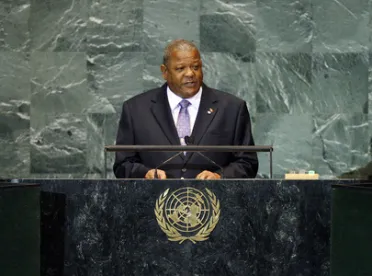Statement
Statement summary
WINSTON BALDWIN SPENCER, Prime Minister and Minister for Foreign Affairs of Antigua and Barbuda, began by quoting a 1920 speech by former United States President Calvin Coolidge, who had said “[…] the benefit of one is the benefit of all, and the neglect of one is the neglect of all.” Those words were just as timely today, he said, as humanity was being tested by the worst economic crisis since the Great Depression. Additional challenges included the increased incidence of pandemics, worsening poverty, the adverse consequences of climate change and tensions over peace and security.
For small island States like his, the impacts of such issues had been exacerbated by ill-conceived interventions, and while many had spoken of a globalization that that would lift all boats on a sea of economic opportunity, it was now clear that such tidescould turn into an economic tsunami that washed away development gains that had taken decades to be realized. Stronger economies had to be aware that their welfare was inseparably bound to that of the weakest nations.
In the pursuit of new strategies, he encouraged exploring alternative models, like that of the Bolivarian Alliance for the Americas, which promoted complementarity as an alternative to competition; solidarity as opposed to domination; cooperation as a replacement for exploitation; and respect for sovereignty rather than corporate rule. He commended the IMF decision to limit conditionalities to those critical to achieving goals of country programmes.
Turning to international financial governance, he called on developed countries to ensure their response strategies involved better international cooperation on tax issues, notably through inclusive frameworks that ensured the equal treatment of small jurisdictions, as stated in the outcome document of the United Nations Conference on the World Financial and Economic Crisis. He urged the Assembly to follow up on the Conference’s outcome and to take an inclusive approach that allowed for participation of those nations that were not members of the G-8 or G-20.
Continuing, he said traditional Western-based models of development cooperation had failed, stressing the need to promote partnerships that supported sustainable development, based on principles of mutual respect, equality and a genuine desire to effect social and economic development. Trade arrangements with the European Union, among others, would work in the interest of the parties, and a focus on development would ensurethose arrangements produced positive results. Further, he called on the United States to unequivocally end its embargo on Cuba.
On climate change, he said the parallels between the global economic crisis and the climate change crisis “are both stark and dire” for small island States. Antigua and Barbuda had joined others at a recent meeting of the Alliance of Small Island States (AOSIS) in sending a strong message on the need for bold and ambitious action. Those States were profoundly disappointed at the lack of action within the Climate Change Convention negotiations to protect their nations. As such, he fully supported China’s call for developed countries to provide new, additional and adequate support to developing nations.
Describing how Antigua and Barbuda had made gender equality and women’s empowerment central to the national development strategy, he also said that gun violence had escalated significantly in recent years, and he requested greater cooperation and United Nations support to eliminate that threat. He fully supported a legally binding arms trade treaty to prevent the illegal international transfer of arms. Also, the threat posed by non-State actors acquiring weapons of mass destruction was shared by countries large and small, and he supported extending the mandate of Security Council resolution 1540 (2004). He forcefully rejected the continued use of the Caribbean Sea for the trans-shipment of nuclear waste.
Finally, he said Antigua and Barbuda looked forward to the erection of a permanent memorial to the victims of the transatlantic slave trade and slavery, and to the start of serious dialogue on the issue of reparations. In closing, he urged all to demonstrate –- in word and deed -– the belief that the welfare of the weakest and the mightiest were inseparably bound.
Full statement
Read the full statement, in PDF format.
Photo

Previous sessions
Access the statements from previous sessions.
